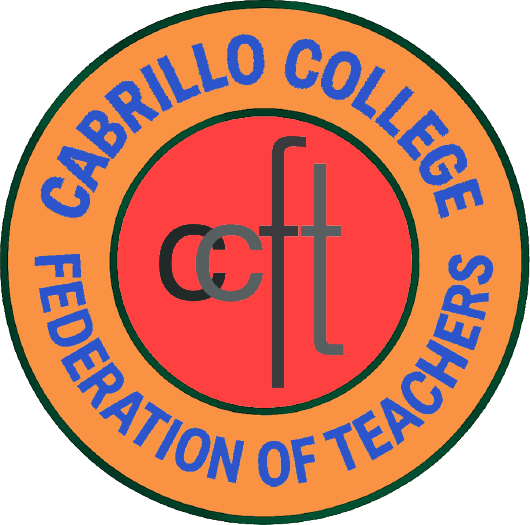When faculty departed for summer break the CCFT negotiations team was still negotiating compensation (salary & benefits) for the current year. Since then, a lot has happened (skip three paragraphs if you already know about the recently ratified negotiated agreements).
First, we approved the following agreement on compensation, which equates to a 3% ongoing salary increase and a 3.5% one-time salary increase:
- a 2.63% ongoing increase to faculty salaries (effectively making the salary schedule 1.5% above last year’s schedule, which included a one-time increase)
- 1% ongoing increase in the adjunct/overload pro rata pay from 63.8% to 64.8% (equivalent to a 0.37% salary increase; this effectively increases the pro rata from 64.3% last year, which included a one-time increase, to 64.8%)
- A one-time, lump-sum payment will be made at the end of October 2015, based on workload for the 2014-15 academic year. Adjuncts who taught less than 6 units will receive $400; between 6-11.99 TUs=$750; 12-14.99 TUS= $1,100; 15 or more TUs=$1,500. Contract/regular faculty will receive a payment of $2,950.
- Status quo on health benefits. Note that faculty who are not eligible for a District-paid stipend now have access to a Bronze plan through the District.
Second, we agreed to continue to pilot program on paid ancillary activities for adjunct faculty. This pilot is an extension of a program that we have run, and modified, since the spring of 2014. Under the current program, there are stipends for adjunct faculty members to serve on designated campus-wide committees. Unfortunately, the District team wanted to remove stipends for most of the adjuncts serving on the Faculty Senate as they believe that the current number of Senate seats should be populated by full-time faculty. As we move into the year, the Faculty Senate will discuss the addition of seats for adjunct faculty, and CCFT hopes to reinstate the provision of a stipend for those positions, given that the Faculty Senate was identified as the highest priority committee for adjunct participation. The Faculty Senate is a key shared governance body that the District has primary reliance on for academic/professional matters.
We also agreed to a pilot program in the HASS division on evaluation. Follow this link to the Negotiations Update.
We commence the 2015-16 academic year with one of the best community college budgets from the state in a long time, a budget that includes resources to fund full-time faculty (intended for faculty more generally if we are above the required faculty obligation number), COLA (1.02%), a large increase in our base allocation (over 4%), growth (3%, only for colleges that are growing), and significant one-time funds. However, college enrollment is down, and the administration is planning to reduce the college by around five percent next year.
Lack of enrollment is likely due to a combination of factors. Higher student fees, an improved economy, and other changes, such as repeatability regulations and the student success act—all may play a roll. These new policies have resulted in narrowing the mission of community colleges and limiting access for some learners (these regulations have a simultaneous intent of getting students in and out quickly, which in some cases is beneficial).
Whatever the causes of this decline, key administrators apparently believe that they have done what they can to increase enrollment, and that we need to shrink accordingly. Many faculty members have another perspective: they want (and have wanted!) to be included in conversations about enrollment and believe that involvement of all the program chairs, for instance, would be a key step in improving enrollment. CCFT will continue to advocate for more faculty input in the enrollment discussion in the current year although the bulk of the conversation will take place at the Faculty Senate.
In terms of negotiations for the upcoming Contract (our current Contract expires at the end of June), CCFT is hitting the ground running. We are currently surveying all faculty regarding Contract priorities and workload issues. Workload agreements are found in Article 11 and include such agreements as teaching load and load factors, class size, distance education, reassigned time, and program chair compensation. We have a workload study group that will compile and analyze information about workload for a few months (Sept.-Dec.), and faculty are encouraged to provide input on these important topics. The CCFT negotiations team plans to commence formal negotiations on the entire contract in November, and hopes to have faculty ratify a contract before the end of the academic year (by May).
CCFT will depend on the participation of all faculty members. We will continue to survey all faculty (look for faculty emails with the survey links). The CCFT Council, which currently has some 40 reps from across campus, will prioritize issues and advise the negotiations team. Please be in contact with your representatives to converse about your sentiments and priorities (for a list of reps, see http://devcp19.ccftcabrillo.org/leaders-and-representatives/)
In addition to contract negotiations, CCFT will continue to advocate for: changes to repeatability regulations that limit student access and success; increased access for AB 540/Dream/undocumented students; and a college that listens to, and values, strong faculty input. All faculty are invited to attend CCFT meetings on Monday afternoons (see the meeting schedule).








